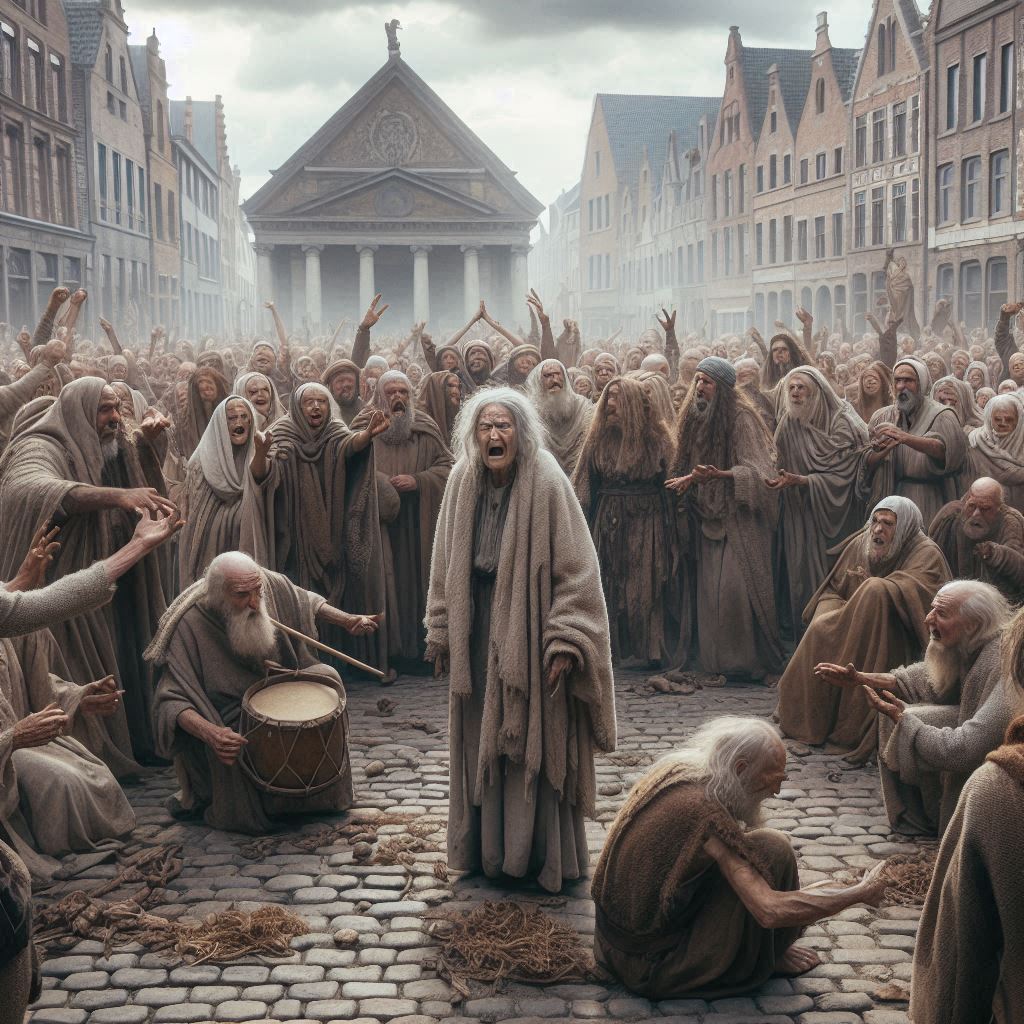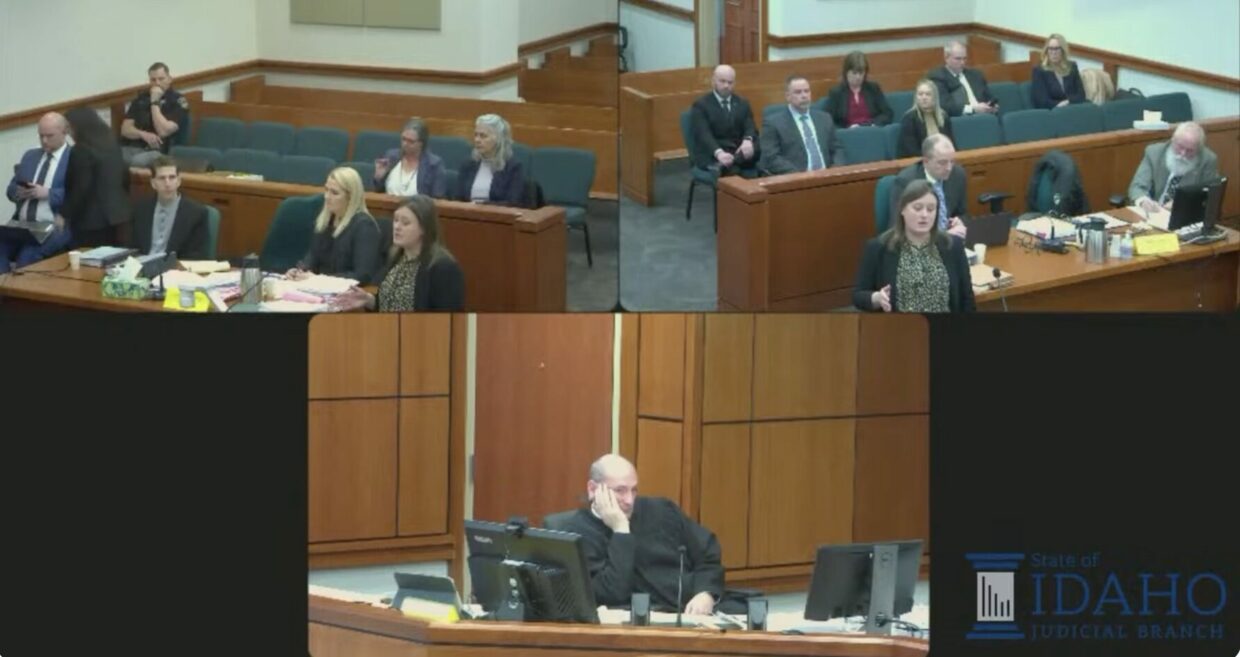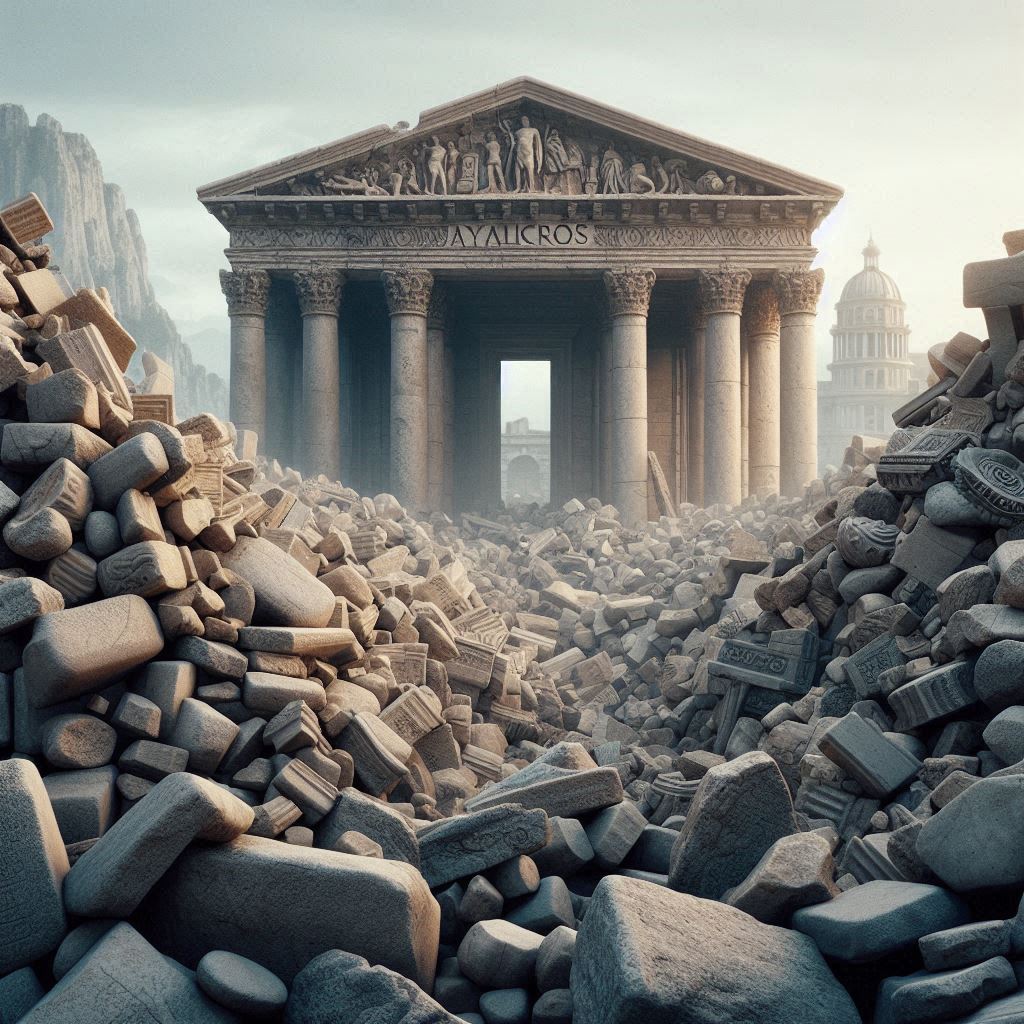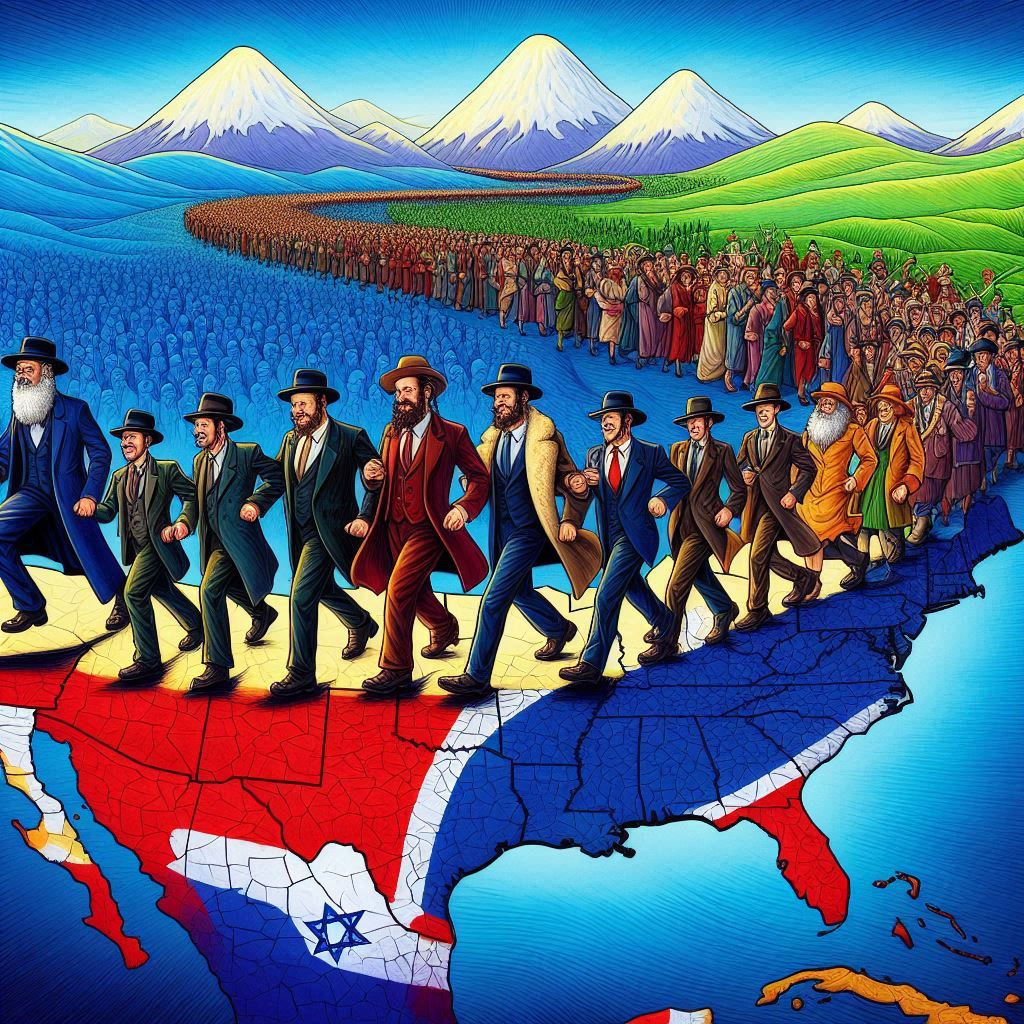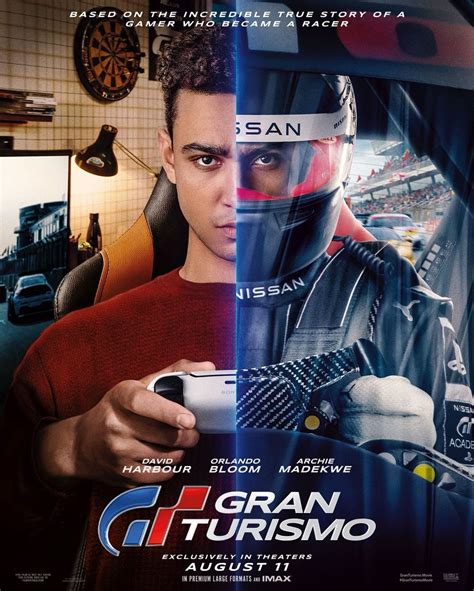Today’s daf starts with things that are quite difficult to talk about: stoning procedures. I’m not going to flinch away from this, though, because to this day, about half of U.S. states have elaborate execution protocols that might masquerade as being more humane, but actually hide a multitude of botched executions. We have to openly discuss state-sanctioned death, no matter how much we now medicalize executions and tuck them behind closed doors, they are part and parcel of our legal system at present. While the talmudic discussion feels cold and crass, it’s important to remember that it was theoretical: not only did they have no power to execute people, and they were reminiscing, but it is also highly unlikely that executions were very common during the Sanhedrin time. So much of this is speculation about execution proceedings that might harken to biblical times.
Anyway, the amoraic discussion starts with a quote from a mishna, according to which the proceedings for preparing condemned men and women for stoning differ: either the woman is a bit more covered up than the man or the man is completely naked and the woman is not. From here on, the sages matter-of-factly turn to examining the differences in procedure. Their point of departure is Leviticus 24:14, the provenance of the whole stoning debacle, where the text refers to a male transgressor and does not, seemingly, allow for the stoning of a female transgressor. This, however, contrasts with the text in Deuteronomy 17:5, which refers to both genders as candidates for stoning: “And you shall bring forth that man or that woman… and stone them with stones until they die.” And if this wasn’t distressing enough, here’s where things take an even uglier turn.
לְמֵימְרָא דְּרַבָּנַן חָיְישִׁי לְהִרְהוּרָא, וְרַבִּי יְהוּדָה לָא חָיֵישׁ לְהִרְהוּרָא? וְהָא אִיפְּכָא שְׁמַעְנָא לְהוּ, דִּתְנַן: הַכֹּהֵן אוֹחֵז בִּבְגָדֶיהָ – אִם נִקְרְעוּ נִקְרְעוּ, וְאִם נִפְרְמוּ נִפְרְמוּ, עַד שֶׁמְּגַלֶּה אֶת לִבָּהּ וְסוֹתֵר אֶת שְׂעָרָהּ. רַבִּי יְהוּדָה אוֹמֵר: אִם הָיָה לִבָּהּ נָאֶה לֹא הָיָה מְגַלֵּהוּ, וְאִם הָיָה שְׂעָרָהּ נָאֶה לֹא הָיָה סוֹתְרוֹ.
The Gemara asks: Is this to say that the Rabbis are concerned that the sight of a naked woman will arouse sexual thoughts among the onlookers, and Rabbi Yehuda is not concerned about such sexual thoughts? But didn’t we hear them say just the opposite, as we learned in a mishna (Sota 7a) with regard to a sota, a woman suspected of adultery by her husband, and who was made to undergo the ordeal of the bitter waters: And the priest grabs hold of her clothing and pulls it, without concern about what happens to it. If the clothes are torn, they are torn; if the stitches come apart, they come apart. And he pulls her clothing until he reveals her heart, i.e., her chest. And then he unbraids her hair. Rabbi Yehuda says: If her heart was attractive he would not reveal it, and if her hair was attractive he would not unbraid it. This seems to indicate that it is Rabbi Yehuda who is concerned about the sexual thoughts of the onlookers.
The concern, you see, is that onlookers might find the spectacle of a naked woman, even as she is on the verge of execution, sexually arousing. And the gemara seems to think this was Rabbi Yehuda’s concern in finding that women should be stoned fully clothed: analogizing from another biblical punishment, the forcing of bitter waters on an adulterous woman, they seem to think that the humiliation is part of the spectacle and want to prevent it becoming a sideshow. But wait, there’s more:
אָמַר רַבָּה: הָתָם הַיְינוּ טַעְמָא, שֶׁמָּא תֵּצֵא מִבֵּית דִּין זַכָּאָה וְיִתְגָּרוּ בָּהּ פִּירְחֵי כְּהוּנָּה. הָכָא הָא מִקַּטְלָא. וְכִי תֵּימָא: אָתֵי לְאִיתְגָּרוֹיֵי בְּאַחְרָנְיָיתָא? אָמַר רַבָּה: גְּמִירִי, אֵין יֵצֶר הָרָע שׁוֹלֵט אֶלָּא בְּמִי שֶׁעֵינָיו רוֹאוֹת.
Rabba said: There, in the case of a sota, this is the reason that Rabbi Yehuda says that the priest does not reveal the woman’s chest or unbraid her hair: Perhaps the sotawill leave the court having been proven innocent, and the young priests in the Temple who saw her partially naked will become provoked by the sight of her. Here, in the case of a woman who is stoned, she is killed by being stoned, and there is no concern about the onlookers’ becoming provoked after her death. The Gemara comments: And if you would say that the fact that she is killed is irrelevant to their having sexual thoughts because the onlookers will be provoked with regard to other women, this is not a concern, as Rabba says: It is learned as a tradition that the evil inclination controls only that which one’s eyes see.
Rabba is distinguishing between the bitter waters issue and the stoning issue, arguing that the latter spectacle is unlikely to sexually provoke men after death in the same way that the bitter waters spectacle for adulteresses is. Indeed, in trying to resolve the contradiction, Rava explains that in the case of the adulteress, part of the sentence includes chastening and disgrace, whereas for a stoned woman, the stoning in itself is the disgrace:
דְּרַבָּנַן אַדְּרַבָּנַן נָמֵי לָא קַשְׁיָא. אָמַר קְרָא: ״וְנִוַּסְּרוּ כׇּל הַנָּשִׁים וְלֹא תַעֲשֶׂינָה כְּזִמַּתְכֶנָה״. הָכָא, אֵין לְךָ יִיסּוּר גָּדוֹל מִזֶּה.
Rava continues: The contradiction between one ruling of the Rabbis and the other ruling of the Rabbis is not difficult either. With regard to a sota, the verse states that other women should be warned: “Thus will I cause lewdness to cease out of the land, that all women may be chastened not to do like your lewdness” (Ezekiel 23:48). In order to serve as an example and warning to other women, a woman suspected of adultery must undergo public disgrace, and therefore the concern about the sexual thoughts that her partially naked body might arouse is disregarded. Here, with regard to stoning, you have no chastening greater than seeing this stoning itself.
Lest you might think that these concerns about the public spectacle of executing women is unique to the gemara, the issue of gender in corporal punishment is present in all cultures. When Malcolm Feeley and I worked on our social history project, we were investigating a phenomenon that Malcolm, along with Deborah Little, uncovered when they studied sentencing in the Old Bailey: the gradual disappearance of the female offender. They discovered that, over the course of the long Nineteenth century, the numbers women, who used to be about half (sometimes more) of the convicts in court, begin to considerably dwindle. This cannot be explained away solely through the disappearance of offenses typically enforced against women (witchcraft, infanticide, adultery, etc.), by the return of men from war, or by the presence of more dominant male accomplices. When I joined the project, we expanded the historical inquiry to cover other countries: France, the Netherlands, Belgium, Germany. We found the same things, even as different regions differed in terms of local wars (that would remove the men from the list of potential offenders/defendants).
We came to the conclusion that the disappearance of female offenders was probably a combination of two shifts. The first was a decline in women’s opportunities to commit crime due to a change in patriarchal style, from public to private. While patriarchal regimes are present since antiquity (as today’s daf proves), women were very much part of the life of the market, the public square, etc. We have Medieval and Renaissance and Early Modern accounts of women as business proprietors, mixed in with the underworld. But the industrial revolution ushers a domestication of middle-class women and a gender segregation of working-class woman into gendered factories and into domestic service in households, which would reduce their opportunities for mixing up in scenarios that involve property crime, etc. The second factor in the decline, we hypothesized, was a decline in public willingness to drag women into the limelight of the criminal process, except in some sensationalized cases. Our colleague Lucia Zedner believes that some of this reflects a “bad-to-mad” shift, where women’s transgressions are medicalized and pathologized rather than medicalized. And our colleague Nicola Lacey documents the increasingly disempowered description of women offenders in period literature. There seems to be an idea that echoes the talmudic sages’ concerns – a notion that it is somehow unchivalrous to publicly criminalize and punish women, which is echoed by criminological theories from the 1950s and 1960s.. But then, Rav Nachman quotes Rabba bar Avuh as stating that minimizing the suffering of condemned women is more of a universal principle, stemming from our care for one another:
וְכִי תֵּימָא: לֶיעְבֵּיד בַּהּ תַּרְתֵּי? אָמַר רַב נַחְמָן אָמַר רַבָּה בַּר אֲבוּהּ: אָמַר קְרָא ״וְאָהַבְתָּ לְרֵעֲךָ כָּמוֹךָ״ – בְּרוֹר לוֹ מִיתָה יָפָה.
And if you would say that two forms of chastening, both stoning and humiliation, should be done to her, Rav Naḥman says that Rabba bar Avuh says: The verse states: “You shall love your neighbor as yourself” (Leviticus 19:18), teaching that even with regard to a condemned prisoner, select a good, i.e., a compassionate, death for him. Therefore, when putting a woman to death by stoning, she should not be humiliated in the process.
But what counts as “a beautiful death” is malleable, and might encompass some gender differences–particularly about the question whether the priority is to minimize public humiliation (e.g., a dignified death) or corporal sufering (e.g., a painless death). And isn’t this exactly the sort of thing that animates our endless litigation and public debate about what can strip death of its “cruel and unusual” features, supposedly making it “kind and usual”?
לֵימָא: דְּרַב נַחְמָן תַּנָּאֵי הִיא? לָא, דְּכוּלֵּי עָלְמָא אִית לְהוּ דְּרַב נַחְמָן, וְהָכָא בְּהָא קָמִיפַּלְגִי: מָר סָבַר בִּזְיוֹנֵי דְאִינִישׁ עֲדִיף לֵיהּ טְפֵי מִנְּיָחָא דְגוּפֵיהּ, וּמָר סָבַר נְיָחָא דְגוּפֵיהּ עֲדִיף מִבִּזְיוֹנֵיהּ.
The Gemara suggests: Let us say that whether one rules in accordance with the statement of Rav Naḥman is a dispute between tanna’im, and according to Rabbi Yehuda there is no mitzva to select a compassionate death. The Gemara refutes this: No, it may be that everyone agrees with the opinion of Rav Naḥman, and here they disagree about this: One Sage, i.e., the Rabbis, holds: Minimizing one’s degradation is better for him than seeing to his physical comfort, i.e., than minimizing his physical pain. Therefore, the Rabbis view the more compassionate death as one without degradation, even if wearing clothes will increase the pain of the one being executed, as the clothes will absorb the blow and prolong his death. And one Sage, Rabbi Yehuda, holds that one’s physical comfort is better for him than minimizing his degradation, and therefore the one being executed prefers to be stoned unclothed, without any chance of the clothing prolonging his death, even though this increases his degradation.
The gemara then proceeds to discuss stoning procedures designed to minimize suffering and raise accountability, e.g., requiring the incriminating witnesses to cast the first stone and thus take responsibility for the outcome of their actions. But the notion that humanizing death is a consequence of loving another as one own can be difficult to swallow. And yet, ever since capital punishment litigation eroded to a point of having protracted, sanitized discussions of whether to use one injection or three, this or that chemical, aren’t we essentially engaging in the same exercise to this day? The fact that the death penalty is on its last legs in the U.S. (I still think so, even with the current administration) makes its last bites especially vicious.

